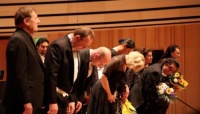Presse Budapest
Minutenlange staande ovaties voor het "Requiem voor Auschwitz" in Praag en Boedapest
Op 4 en 6 november 2012 vonden in Praag en Boedapest twee uiterst succesrijke uitvoeringen plaats van het “Requiem voor Auschwitz”, gecomponeerd door deZwitsers-Nederlandse autodidact-componist Roger Moreno-Rathgeb uit Vaals, en uitgevoerd door het internationale gezelschap van de Roma en Sinti Philharmoniker uit Frankfurt o.l.v. de Roma-dirigent Riccardo Sahiti.
Na het grote succes tijdens de wereldpremiere in Amsterdam op 3 mei jl. werden ook de uitvoeringen in het Rudolfinum te Praag en in de MÜPA te Boedapest met minutenlange staande ovaties gehonoreerd.


Tijdens de uivoering in het Rudolfinum te Praag. Staande ovatie na het concert in het Rudolfinum te Praag.
Met de 24-jarige sopraniste Pavlina Matiova stond voor de eerste keer in de geschiedenis een Roma-zangeres in de Dvorák-concertzaal van het Rudolfinum.
Door de grote belangstelling voor dit werk in pers en media werd in het openbaar nadrukkelijk op de schrijnende hedendagse situatie van de Sinti en Roma in Tsjechie en Hongarije gewezen, en de aanwezigheid van talrijke hoge vertegenwoordigers uit regering en stadsbestuur tijdens die twee uitvoeringen laat enige hoop opkomen, dat er op dit gebied in toekomst wellicht iets zal gaan verbeteren in het Oosten van Europa.
Tijdens de uitvoering in de MÜPA te Boedapest. Na de uitvoering in de MÜPA te Boedapest.
George Soros, Amerikaans zakenman, filantroop en publicist van Joods-Hongaarse afkomst, hield voorafgaande de uitvoering in Boedapest tijdens een receptie een vlammende toespraak, waarin hij benadrukte, hoe belangrijk dit werk is voor de instandhouding van het gedenken aan de slachtoffers van de Holocaust. Als ondersteuner van het Holocaust Memorial Museum te Washington beloofde hij tijdens een gesprek met componist Moreno en Dhr. Zoni Weisz om ervoor te zorgen, dat het “Requiem voor Auschwitz” ook in de VS uitgevoerd zal gaan worden.
George Soros in gesprek met componist Moreno, Piroschka Triska en Dhr. Zoni Weisz
The Requiem for Auschwitz in Budapest, inaugurated by Mr. George Soros, concluded with big success
09-11-2012 - Romedia Foundation
 The premiere of the Requiem for Auschwitz, organized by the Romedia Foundation, arrived to Budapest after Prague and Amsterdam and was held on the 6th of November in the Palace of Arts of Budapest with full concert hall. The concert aimed at commemorating the victims of the Nazi genocide, in particular the murder of half a million Roma and Sinti: the Pharrajimos.
The premiere of the Requiem for Auschwitz, organized by the Romedia Foundation, arrived to Budapest after Prague and Amsterdam and was held on the 6th of November in the Palace of Arts of Budapest with full concert hall. The concert aimed at commemorating the victims of the Nazi genocide, in particular the murder of half a million Roma and Sinti: the Pharrajimos.
Composed by Dutch Sinti musician Roger Moreno Rathgeb, the Requiem was performed by the Roma and Sinti Philharmonic Orchestra and conducted by Riccardo M. Sahiti. The array of international artists was complemented in occasion of the Budapest premiere by Hungarian participants: a sixty members choir, with the St. Ephraim Choir at its basis as well as four soloists: Ildikó Szakács soprano, Judit Rajk contralto, Zoltán Megyesi tenor and István Rácz bass.
 Renowned young theater director, Márton Gulyás, thought of giving a personal “task” of remembrance to the audience: young Roma distributed stones with Roma victims’ names carved in them, while survivor Erzsébet Szenes Brodt, one of the last eyewitnesses of the Pharrajimos, shared her memories about the night of the 2nd of August, 1944, the night when the Gypsy lager was exterminated.
Renowned young theater director, Márton Gulyás, thought of giving a personal “task” of remembrance to the audience: young Roma distributed stones with Roma victims’ names carved in them, while survivor Erzsébet Szenes Brodt, one of the last eyewitnesses of the Pharrajimos, shared her memories about the night of the 2nd of August, 1944, the night when the Gypsy lager was exterminated.
The opening ceremony of the Requiem Concert was attended by embassies and international organization representatives, as well as Erzsébet Szenes Brodt and Béla Danyi: the Holocaust survivors who gave their testimonies to Romedia in occasion of the Requiem for Auschwitz events.
Mr. George Soros, guest of honor, gave a memorable speech, in which he recalled his personal memories about the deportations in Hungary, highlighting in particular how as a child he learned the importance of resisting injustice. Mr. Soros called for the necessity to remember especially those who never gave up hope and defied oppression.
 Romedia Foundation is responsible for bringing the Requiem for Auschwitz to Budapest. Romedia has for the past 20 years worked to change public perceptions of the Roma. The Requiem event series organized in Budapest are part of these efforts: a Documentary Film Festival was already held with great success in October, and an Art Exhibition is soon to be hosted by the French Institute, showcasing the works of Ceija Stojka Roma Holocaust survivor, and Otto Pankok, on November 15-23.
Romedia Foundation is responsible for bringing the Requiem for Auschwitz to Budapest. Romedia has for the past 20 years worked to change public perceptions of the Roma. The Requiem event series organized in Budapest are part of these efforts: a Documentary Film Festival was already held with great success in October, and an Art Exhibition is soon to be hosted by the French Institute, showcasing the works of Ceija Stojka Roma Holocaust survivor, and Otto Pankok, on November 15-23.
REQUIEM FOR AUSCHWITZ - CULTURE, POLITICS AND MUCH MORE
The first tones of the orchestra started, I was in the backstage with Katalyn Barsony and Marion Kurucz, their faces shined with relief and happiness. A year and half of preparation of the event was just behind them and all the struggle with money, logistics and even politics resulted in an almost full concert hall awaiting for a great musical experience. They did a great job, and I was so proud that I am a member of the board of organization that organized such a great and high level cultural and political event!
Romedia Foundation, on 6 November 2012 organized in Budapest in Mupa concert hall a concert that is part of the project Requiem for Auschwitz. As the website of the project is saying, Requiem for Auschwitz is amonument in music, film, images and words. And in deed it is. Moreover, Requiem was composed in 2009 by the self-educated Duch Sinto musician Roger “Moreno” Rathgeb, who wished to commemorate all the victims of the Nazi genocide. It is performed by the Roma – und Sinti – Philharmoniker from Frankurt am Main, conducted by Rom conductor Riccardo M.Sahiti.
As any other events of the project that took place in Amsterdam and Tilburg in May and shortly before Budapest in Prague, this one was also accompanied by series of supportive events, starting with the festival of documentary movies, art exhibition, etc. Though what was very important is the attention that this concert get in Hungary, country that is lately famous for killing Roma people, increase of ultra-right politics in public and marching of Jobbik garda in Romani neighborhoods. Romedia was working hard on the public outreach, their breathtaking TV spot was being broadcasted on many TV stations, radio spot was aired regularly and their posters were display almost everywhere across the city center in Budapest! As Katalyn was saying, this was the first time that such message was sent out there on so many platforms. And the reward was just worth it.
Requiem for Auschwitz was more than cultural event, it was also more than a political event, it showed that Roma has it place in the society and by paying the tribute to the victims of Romani holocaust we always have in minds all the other who suffered with our ancestors. I was so happy to see many young Roma people in the hall. And at the end, when my friend Katalyn Barsony went on the stage to thanks and greed the audience, it made me almost cry! I was so happy to see that the young Roma generation is taking seriously their commitment and that they are able to contribute with their work to society as whole.
Written by Gabriela Hrabanova
Auschwitz-rekviem – hiánypótló programsorozat
mûvei még soha nem voltak ugyanis kiállítva Magyarországon. Továbbá az Összeurópai Roma Filharmonikusoknak is ez lesz az elsõ hazai koncertjük. Tudni kell, hogy a Romédia Alapítvány alapvetõen filmkészítéssel foglalkozik, a fõ profilunkat az új média és a filmgyártás képezi.
BRABANTSE DAGBLAD
Roma trots op hun Requiem bij uitvoeringen in Boedapest en Praag
Door René van Peer
Het Requiem voor Auschwitz is na uitvoeringen in Tilburg en Amsterdam Europa ingetrokken. Geschreven door autodidact Roger ‘Moreno’ Rathgeb ter nagedachtenis aan alle slachtoffers van het Poolse vernietigingskamp beleefde het afgelopen voorjaar zijn première. Eerder deze maand is het uitgevoerd in Praag en Boedapest. “De Roma zijn ontzettend trots dat hun mensen optreden in het Rudolfinum en het Paleis van de Kunsten, twee prestigieuze zalen”, zegt Marcel ‘t Sas. Als waarnemend directeur van de organiserende stichting Alfa uit Tilburg bezocht hij beide concerten.
Het idee om het Requiem op de planken te krijgen werd geboren in het onderkomen van het International Gypsy Festival, aan de keukentafel. Albert Siebelink, die aan de wieg stond, klopt glunderend op het blad: “Fantastisch toch dat het vanuit zo’n bescheiden plek zo’n vlucht genomen heeft. Het is niet een concert dat je zomaar even op verschillende plekken neerzet. Het is een immense onderneming. Wij zorgen voor het orkest, maar in ieder land moet een andere organisatie de rest op zich nemen: zorgen voor de zaal, voor de solisten, voor een programma met een expositie en een congres rond de uitvoering.”
In Praag werd de uitvoering op poten gezet door de organisatie achter een jaarlijks muziekfestival, in Boedapest waren het mensen die zich normaal gesproken met film bezighouden. Dat zorgde voor verschillen in het programma rond het Requiem in deze steden. “In Boedapest lag de nadruk op cultuur”, aldus ‘t Sas. “De organisatie was opvallend jong. Er kwamen veel Roma op de uitvoering af. In Praag werden meer de maatschappelijke kanten belicht. Daar zaten veel Roma vrouwen in de zaal. Die barstten zowat van trots dat de sopraan een van hen was.”
Maar belangrijk is vooral dat ook het Tsjechische en Hongaarse publiek een beeld van Roma te zien krijgen dat afwijkt van de cliché’s die onverminderd bij de mensen leven. “Daar is het eigenlijk om begonnen”, onderstreept Siebelink. “In Nederland horen Sinti en Roma tot de vele minderheden. In die landen vormen ze eigenlijk de enige minderheid, een aanzienlijke groep bovendien. Daardoor zijn de onderlinge spanningen veel groter. Het Requiem is een aanleiding om een breder verhaal te vertellen, om aandacht te vragen voor de moeilijke positie van de Sinti en de Roma, om het publiek een ander beeld te geven van die groepen.”
Dat gebeurt al doordat een orkest van Sinti en Roma dit werk in belangrijke zalen speelt. De reacties van het publiek zijn steeds overweldigend. Het maakt ook indruk op de Roma, vertelt ‘t Sas. “Een van de leden van het orkest, violist László Trucz, was begin jaren vijftig uit het symfonieorkest van Boedapest gezet omdat hij Roma was. Hij is naar Darmstadt gegaan en heeft daar een carrière opgebouwd. Dit was de eerste keer dat hij weer in de stad optrad, in het Paleis van de Kunsten. Het enige dat hem nog gelukkiger kon maken, was voor zijn vrouw een fles Hongaarse Tokaj wijn kopen.”
Er liggen nog twee uitvoeringen in het verschiet. Woensdag in Frankfurt, en eind januari in het Poolse Krakau als onderdeel van de Internationale Gedenkdag van de Holocaust.



